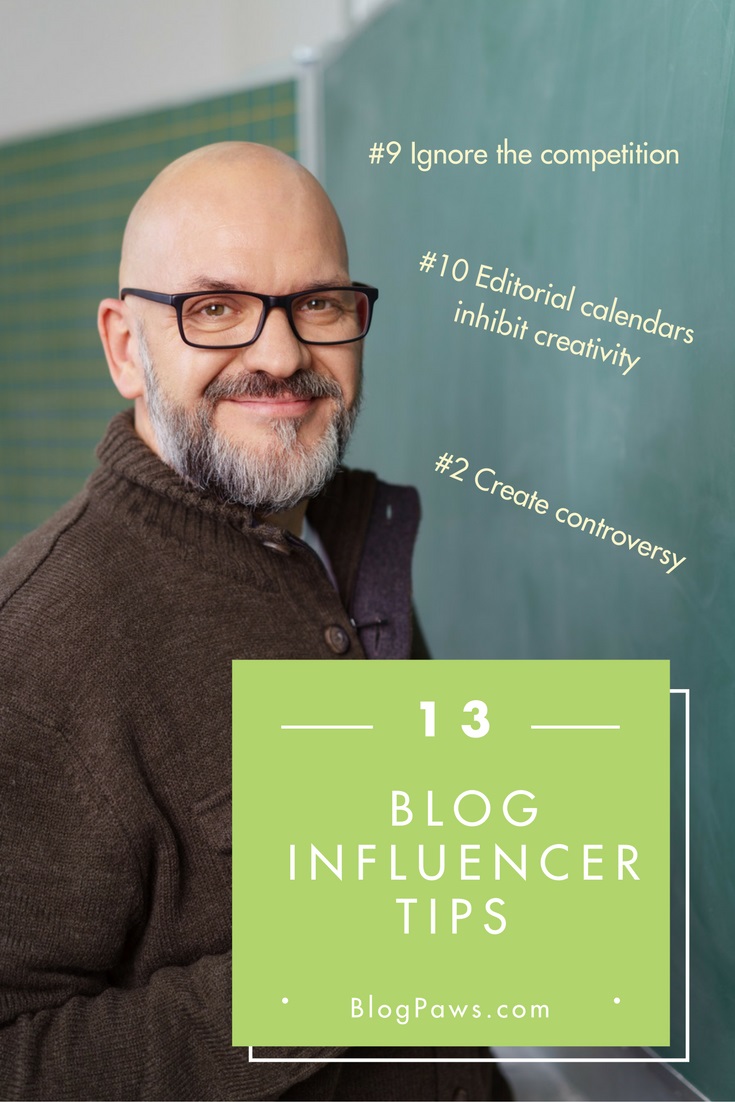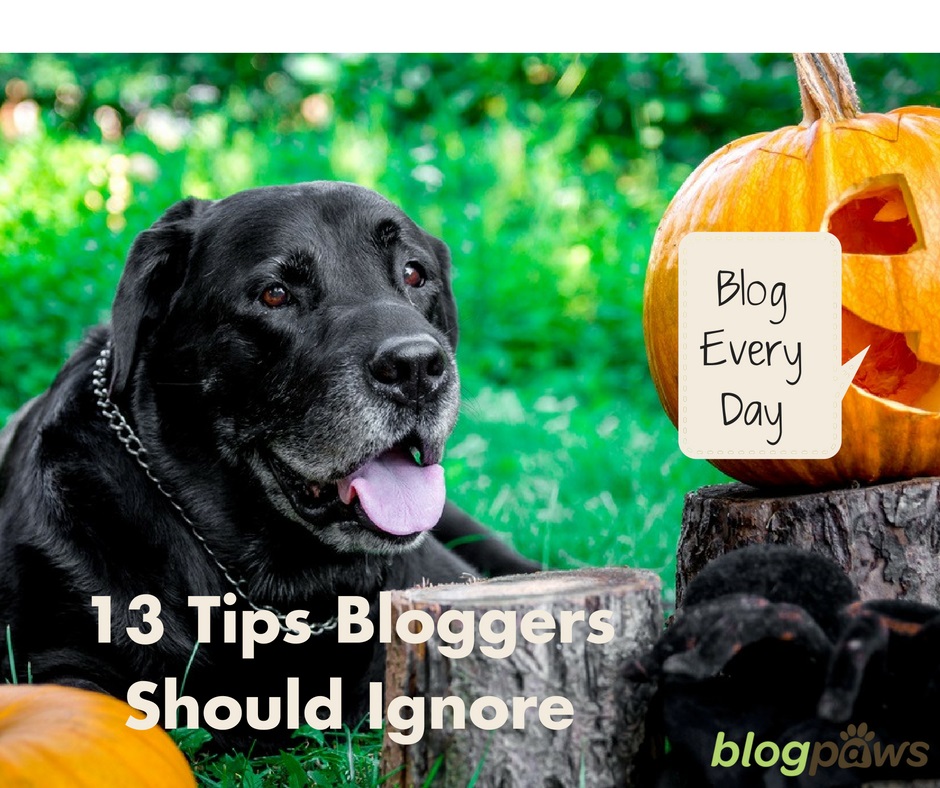13 Blogging Tips Influencers Should Ignore
Best practices are best practices for a reason, right? Yes, but you can find misinformation in any area of business, and that includes blogging and the marketing your blog posts. In this post, I will discuss 13 blogging tips that influencers should ignore. Why thirteen? Because it’s October, close to Halloween, and thirteen is an intriguing number! Believe me I could probably list close to two dozen (or more) tips that blog influencers should ignore, but then that will take you away from doing what you do best–blog!
If you’re working with a mentor, business coach or accountability partner, chances are you have heard that you should ALWAYS do this or NEVER do that when it comes to your blog business. I am a firm believer in not EVER using absolutes! See what I did there?! Remember, what works for one person (their “always”) might not work for you. Conversely, what didn’t work (one person’s “never) may bring you stunning results.
When it comes to running my writing and freelance business, I listen to what my accountability partner and business coach say, but I know myself and my business well enough to know whether I want to attempt to implement a suggestion that has been offered. That being said, rarely will I outright reject an idea offered by those in my circle whom I trust–if I were going to do that, why have them in my circle? You need to know your business, and your business model, well enough to know what will or won’t or just might work. You should be tracking changes you’ve implemented to see if they reaped the results you were hoping for.
Your business plan is the ideal starting point for listing marketing, blogging and business growth methods, implementing metrics to determine success or failure and charting your growth.
13 Blogging Tips Influencers Should Ignore
Blog every day.
What?! I am certain you’ve heard that you need to blog every day. If you have the time and the content, and if your content will deliver at the highest levels, then sure, blog every day. If, like most of us, you simply do not have time to blog daily, then don’t. Only you can determine what your blogging frequency will be. Decide that you will blog one, two, three or more times a week and stick with it. It’s better to be consistent and offer quality content than it is to commit to blogging every day, but offering poor quality content.
Create controversy.
Sure, you can create controversy. You could have jumped on the latest attempt at BSL against Pit Bulls and said you agreed with it. If that was your stance, be prepared to defend it. You will be attacked by dog lovers of all stripes who will point out that most breed specific legislation — if read literally — could pertain to any dog — even your miniature poodle. Controversy is certainly a way to get eyes on your page, but it can be exhausting and hurtful and you may ruin your reputation within the pet community. If, however, you have strong feelings about a particular topic and are thick-skinned enough to defend it, then by all means, have at it.

Yes, there are those who think that search engine optimization is a myth. SEO is not relevant in a Google search. SEO will not help your blog get found. To that I say, politely, you’re wrong. Use search terms that suit you and your blog. SEO shouldn’t be the be all and end all of your blog writing, but you do need to “claim” the keywords for which you want to be found. What do I mean by “claim” them? For example, I want to be found for “time management,” “overwhelm,” “goal management,” “diva poodle,” etc. So I will use those terms in my blog posts. If someone is doing a search for “time management tips” for example, my blog posts just might pop up in the search.
Keyword density doesn’t matter.
If you’re keyword stuffing, of course keyword density matters. As for whether Google has announced, “the keyword density of a post must be X%” that hasn’t happened. We use SEO by Yoast for our BlogPaws blogs and it provides SEO best practices. The plugin lets us know whether our keyword has been found in the post, how many times and what the density is. I glance at that because I want to be sure I have used keywords because I want my posts to be found in a search. Keyword stuffing will get you dinged by Google. What is keyword stuffing? It’s when you write a sentence like this, “Pet bloggers need to be blogging about pets when they want their pet blog to be found in pet blogging searches.” What?! Is that even a sentence? Sure, it is–a keyword stuffed one. Each sentence you put into your blog post should be there for a reason; that reason is to help your reader, not to keyword stuff.
Your blog posts should be 300, 500, 1500 or 4000 words.
Yes, the SEO by Yoast plug in will make alert you if your post is fewer than 300 words so that may mean that 300 is an optimal length. What is the optimal length of a blog post? Quite frankly, it’s the length of post that your readers will read. Wish I had a better answer for you. If your readers stick with you when you’re writing 4,000+ word posts, then keep writing them. If you notice the time on page is only a few seconds, chances are they aren’t reading your entire 4,000 word post. If you have a topic that warrants thousands of words, you may want to test it out and see if your readers will stick with it. If not, you may want to break it up into a series. Check your analytics and see where people are landing on your website and how long they are staying. This might be the metric by which you determine how long your blog posts should be.
If an image is online, you can use it.
Wrong! You can only use images that you own the copyright to. You can purchase images from any number of sites. Once you have the license, you can use the photos. The site from which you purchase the photos may have restrictions on how you can use the photo or may want you to use particular attributions. Using a photo that you’ve found online can open you up to heavy fines. What’s best is to use your own photos if that is possible. In my case, I have a houseful of pets, but they rarely cooperate when I need them to for a photoshoot. The images I use, though, are those that I have purchased. Online does not mean fair game.
Be a “newsjacker.”
Hurricane Matthew ripped through the eastern end of the country wreaking havoc. You live in Connecticut but decide, “Hey, this is a trending topic I’m going to blog (aka newsjack) about it.” If you have great information to share with those impacted by a weather emergency or other hot news topic, then by all means, write about it. If, however, you’re only looking to jump on a trending topic, you’re artificially inflating your numbers and in the long run, your blog won’t see sustained growth.
Write with an eye to “going viral.”
What makes a blog post or video go viral? It’s anyone’s guess. Of course, as bloggers we want to go viral, but if that’s all you’re striving for, you will find yourself exhausted from chasing that ideal. It isn’t a strategy for sustained growth.
Ignore the competition.
You can’t ignore the competition. It’s as simple as that. Why not, instead, build a relationship with a competitor you admire and collaborate on a post. Yes, you will need to have something of value to offer that competitor, aka pet blogging colleague, but a collaborative relationship is better than a combative relationship. The pet blogging community is small enough that you can befriend someone you admire and see if there is a way you can work or blog together that will be of benefit to both of your blogging endeavors.
Using an editorial calendar inhibits your creativity.
Creativity comes from the heart and soul. I am a “pantser” (this is a term used by fiction writers who don’t want to outline a story, they want to write it by the seat of their pants). I just want to let the thoughts flow from my fingertips. My muse will inspire my posts. Sigh. Chances are if you wait for the muse, you will be waiting a long time. The time you spend preparing an editorial calendar will be time you don’t have to spend ripping your hair out wondering what you will blog about today. Imagine sitting down to write a blog post and knowing that you don’t have to fight for a topic–it’s right there in your editorial calendar. Stress-free writing anyone?!
You’ve written a post about “traveling with your dog” and it was the most viewed post on your site EVER. What do you do? You keep writing about “traveling with your dog” hoping to replicate that success. Stop. Be grateful that you had that one top post. Recycle it a year or so later, but don’t rehash the same topic hoping to spark the same kind of flame. If your readers know that all you will be writing about is “how to travel with your dog” they will eventually stop reading because they already know what you’re saying.
Never quote a source.
You are THE expert in your topic so there is NO reason for you to quote a source, right? Not so much. Even if you’re an expert on XYZ topic, it can’t hurt to ask another subject matter expert for a quote or two to add to your blog post. Quoting a source could potentially amp up eyes on the page and your credibility in the blogging world. Also, the source just might share your blog post on his or her social media and that will surely help you.
Not writing to an audience.
If you’re not writing for your audience, for whom are you writing? If you are writing just because you want to get the words out of your head and onto the screen, then have at it. If you’re looking to be a blog influencer, then you need to know who your audience is and give them content they want to read. If you’re not solving a problem or relieving a pain point or sharing information that your audience needs and wants, then you’re blogging to an empty void.
What blog tips have you heard that made you scratch your head and think, “What?!” Have you tried any blog hacks that you weren’t sure were going to work, but that skyrocketed your blogging efforts? We’d love to hear? What blog tip would you offer the first-time or newbie blogger who is looking to become a blog influencer?
Robbi Hess is an award-winning author, full-time writer, newspaper columnist, writing coach and time-management guru. She works with bloggers and solopreneurs and blogs at All Words Matter.



